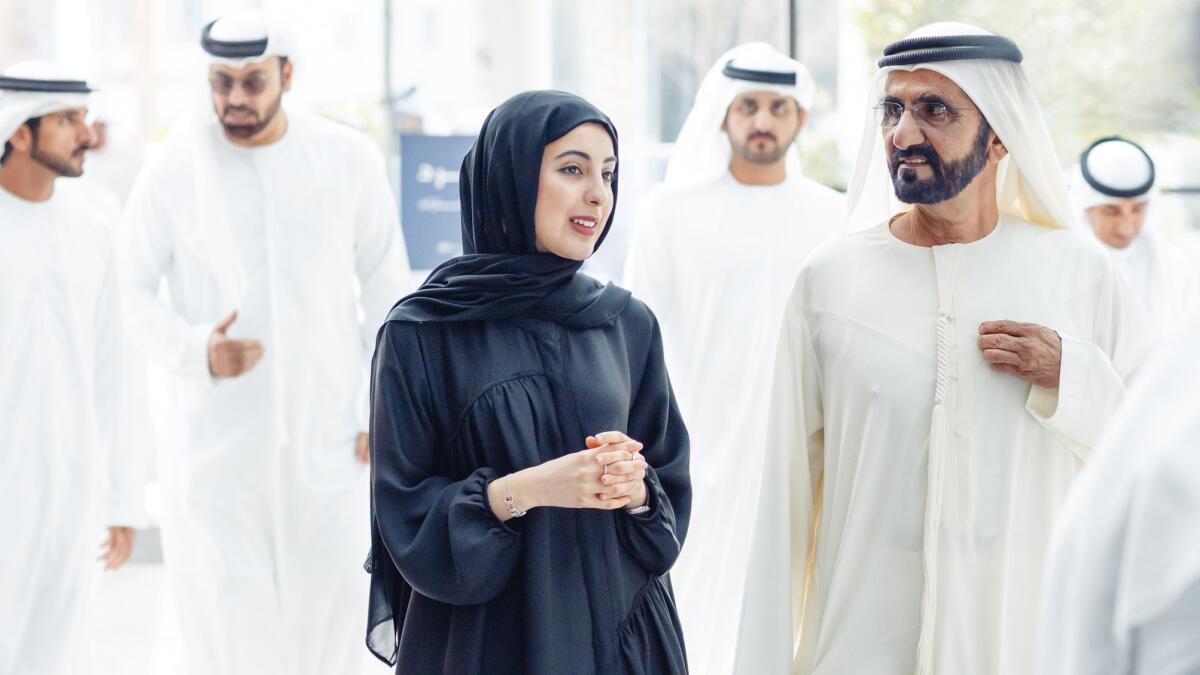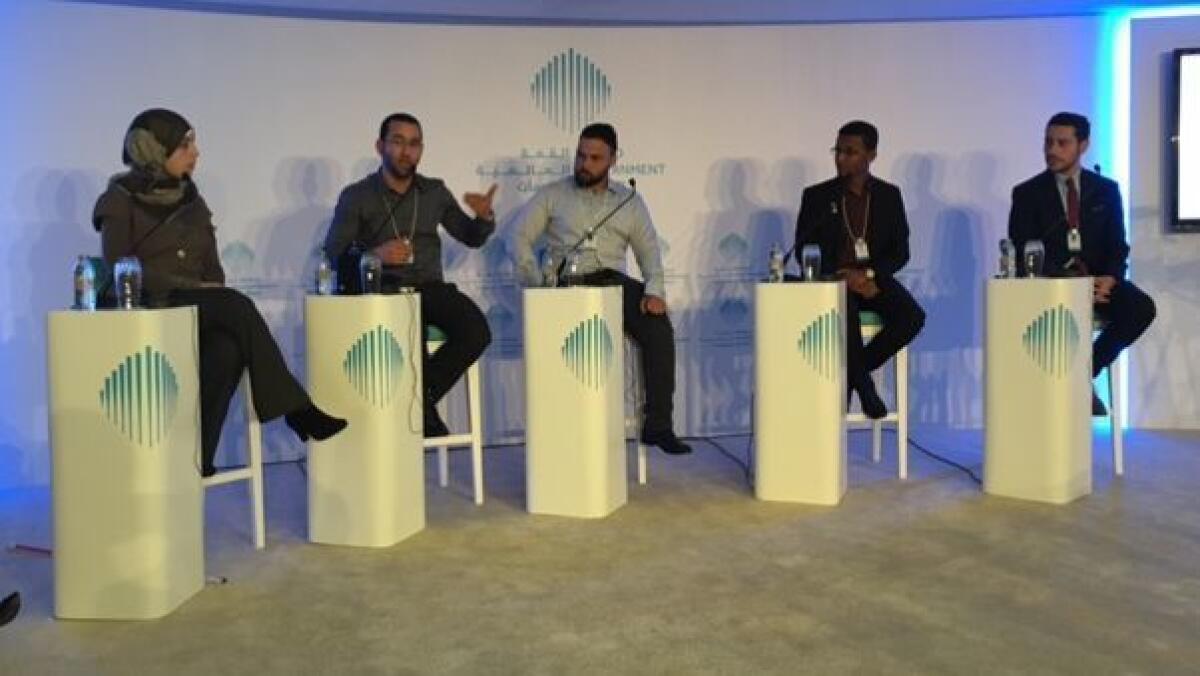Q&A: United Arab Emirates’ 23-year-old minister of youth affairs has high aspirations for her peers

- Share via
Reporting from Dubai, United Arab Emirates — They are often ignored, criticized and misunderstood, and in much of the Arab world, they are the target of misconceptions and stereotyping.
But in the United Arab Emirates, young people have a new champion. Shamma bint Suhail Faris Mazrui is the Persian Gulf nation’s minister of state for youth affairs. At 23 years old — she was 22 when appointed last year — Mazrui is believed to be the youngest government minister in the world.
Her role is to create a bridge between the government and young people, represent their issues and aspirations on the ministerial council and develop a strategy for improving their lives and their engagement in society.
The median age in the UAE is 30, according to the CIA’s World Factbook. Emirati citizens make up about 1.4 million of the country’s 9.3-million population, which is largely made up of expatriates.
Mazrui holds a bachelor’s degree in economics from New York University Abu Dhabi, and a masters of public policy with distinction from the University of Oxford, where she was her country’s first Rhodes scholar.
The minister shared her views on the status of youth in an interview with reporters during February’s World Government Summit in Dubai.
Her comments have been edited for length and clarity.
What concerns Emirati youth?
It’s this restless quest for purpose. Around the world I think that’s very important, trying to create hope and not give up. Hopelessness results when youth are not seen as resources, and apathy results when they’re not seen as assets. Violence around the world is a huge challenge, when youth are not valued.
We try to tackle that from the framework of engaging with our young people and listening skillfully to them … and focusing on them. Where are our stars? Where’s our pipeline of talent? What are they doing? We want them not only in the government, but in the private sector. We want them as entrepreneurs. We want this region to flourish with their energy.
In the UAE, Arab youth are similar to youth around the world. They all want to go to the best universities. They all want to have stable careers. They want lives of purpose and they want to feel part of a cohesive community and family.
What about problems such as gangs, gun culture, drugs and alcohol that face youth in the United States? Are there comparable issues in the UAE?
Road accidents. It’s insane. Every day I get three or four notifications of a young person dying. They drive really fast. That’s a challenge, but it’s something we’re trying to work with. The minister of the interior now has a youth council. They are encouraging youth who work in the ministry to figure out what kind of initiatives will help that ministry and the police to understand what makes youth drive fast [and] how we can help them.
Is there a particular profession that Arab youth aspire to?
It’s not like the U.S. and trying to become famous. I think we have this tendency where everyone wants to work in the public sector. It’s a bit of a challenge trying to increase the number of youth in the private sector … but I think it’s an exciting opportunity, especially focusing on entrepreneurship.
Different people want to be different things and our goal is to make sure they reach their full potential in whatever profession they want to be in.
What do young Emiratis do for fun?
We’re exactly like young people around the world. A lot of the females here, they love fashion. They love the latest designers and Paris Fashion Week. We have males who love football. They’re crazy about soccer or golf or so many other sports. We have so many malls. We love movies.
Some people may feel that because of the way we dress, we are aliens. But it’s normal. We do similar things, just like other young people.
I find it beautiful how every culture has its own way to express its beauty. We wear our traditional clothing and we try to be grounded in our traditional heritage and respect that culture and respect our values, but at the same time, we also balance it with modernity.
What about the influence of extremism on Arab youth?
One of the things we focus on is a national values program, and what our values are as Emirati youth. [It’s] tolerance, peaceful coexistence. We work on a full framework to tackle that.
When you look at national youth strategies around the world, they don’t focus a lot on values. They focus on employment and civic engagement, but they forget … that you need to look at yourself and what’s your purpose and understand what our goals are, why are you here, how can you live for something beyond yourself.

If youth are not engaged with their government, if there’s a gap between the government and their youth and government doesn’t understand the needs and true purpose of youth, this vacuum will be filled by something else and it could be filled by something we cannot afford, or don’t even want to anticipate.
And that’s why in the UAE we focus on youth engagement as something that is very important.
How do you respond to the anti-Muslim sentiment that we’re seeing in America?
We grew up in a country that has 200 nationalities and people from so many different religions. We try our best to show our best image of what it means to be an Emirati, or a Muslim man or woman.
It does hurt us when we see people attacking Muslims and stereotyping, but we all have a role to play in trying to promote that positive image. We have over 2,000 Emiratis who study in the U.S.
How are you addressing the tumult surrounding the clash of religions in the world today?
Let me tell you about how the UAE wants youth to be and how youth want themselves to be. The first pillar is growing into confident, tolerant citizens imbued with the spirit of entrepreneurship and a sense of responsibility for their nation. The second is for our young people to be grounded in our nation’s heritage and values, but also open to the world. Third is pursuing an active and healthy lifestyle. Fourth is how can young people rise to the 21st century challenges — through lifelong learning, through education, through excellence and so on.
I think the most important aspect is how can you change the mind-set of young people around the world into their role of contributors to government.
Our founding fathers built this nation out of a desert 45 years ago by unity, perseverance, hard work, effort, and I think now it’s time for us as youth to scale up and contribute to making our country achieve greater heights.
For more on global development news, see our Global Development Watch page, and follow me @AMSimmons1 on Twitter.
ALSO:
UAE’s minister of happiness insists her job is no laughing matter
Here’s one way of fighting terrorism that the U.S. may be rethinking under Trump
More to Read
Sign up for Essential California
The most important California stories and recommendations in your inbox every morning.
You may occasionally receive promotional content from the Los Angeles Times.














